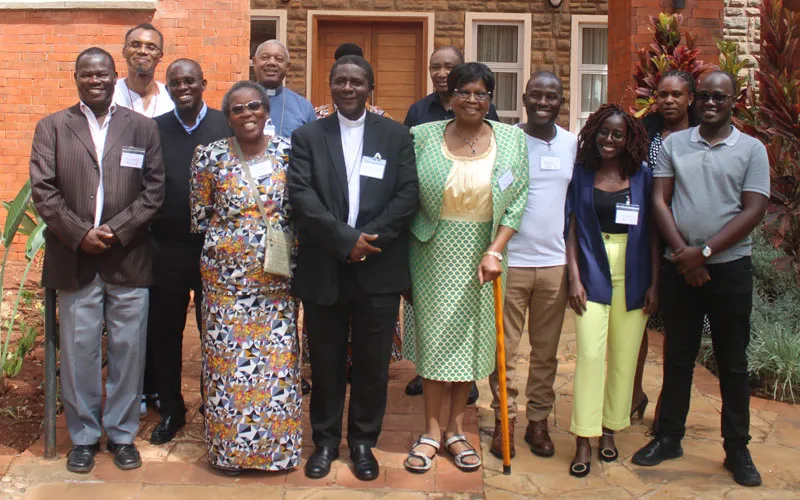Clericalism is not just a problem of the Clergy, members of the newly constituted Synodality Resource Team (SRT) for Africa have said, and called on the Laity to play their role in de-clericalizing the Church.
In a two-day workshop they held to devise ways to deepen the understanding of a Synodal Church on the continent, the SRT members who shared their experiences with the Synod on Synodality noted that the phenomenon of clericalism had surfaced prominently in synodal conversations.
They described clericalism in various ways, including members of the Clergy abusing their positions, the Clergy feeling that theirs is the final word, as well as refusing to share out roles that the Laity can perform.
The Principal of the Nairobi-based Jesuits’ Hekima University College said that clericalism is manifested by “Priests who do things that can be done, even in a better way, by the Laity.”
Fr. Marcel Uwineza highlighted a role such as financial administration of the Church, noting that any Catholic Church professional can handle church finances.
“There are Priests who don’t take breaks from work for fear of losing control,” Fr. Uwineza said.
The Rwandese Jesuit Priest recalled that months leading to Kenya’s August 2022 general elections, it was the Clergy who dominated in the Church statements that were released to the media, and added, “In other places like Germany, it is the Laity who take a center stage in addressing social issues.”
It was observed that parishioners in some places are usually frustrated when they meet to discuss matters of the Church, knowing that it is the Priest who has the final word, whatever they come up with in those meetings.
Clericalism is also seen in a Priest’s abuse of position, thinking that they are better than everyone else, “When they feel that they are super humans,” Fr. Uwineza said, and added, “I always tell students at Hekima to never forget that their calling to Priesthood doesn’t make them better humans than anyone else.”
According to Bishop Willybard Lagho of Kenya’s Malindi Diocese, clericalism is also brought to the fore in the internal conflicts between members of the Clergy who, sometimes, engage in power struggles.
“When a Priest is transferred and finds a project in progress, ignores it and starts a totally new project, forgetting that it is the same Christians who contributed towards the project he ignored, that is Clericalism,” Bishop Lagho said.
However, it also emerged during discussions that the team held at Africama House, the Jesuits Conference of Africa and Madagascar (JCAM) headquarters in Nairobi, that the Clergy are not solely to blame for clericalism in the Church.
“Sometimes, it is the laity who elevate the Clergy too much that clericalism starts manifesting itself,” Fr. Uwineza said during the workshop that was convened by the African Synodality Initiative (ASI), which is a partnership between the Jesuits Conference of Africa and Madagascar (JCAM), the Symposium of the Episcopal Conferences of Africa and Madagascar (SECAM), and the Association of Member Episcopal Conferences in Eastern Africa (AMECEA).
He added, “I remember one day after celebrating Mass, a woman came to me and expressed her bitterness over my allowing women to distribute communion.”
According to Dr. David Kaulem of Arrupe Jesuit University, the Laity advance clericalism when they fail to perform their roles in the Church, leaving everything to the Priest.
“I believe that it is us lay people who are more Clerical in terms of engaging and participating. There are many things we can do as men, women, youth and children in the Church but we don’t do them,” Mr. Kaulem said.
Members of Africa’s SRT team agreed that de-clericalizing the Church requires formation.
The team has embarked on the development of a manual to be used in various training activities to deepen the understanding of “a Synodal Church”.
The Synodality Formation Module, after it is completed, will be used in various formation programs in schools, in Seminaries, in Small Christian Communities (SCCs), and in all other communities inside, and even outside structures of the Church.
Meanwhile, Bishop Lagho has called for the rethinking of Church structures, such as SCCs that he says have been presented as “exclusive clubs”, locking out many Christians who do not feel like belonging to such communities.
“Just how free are Catholics to attend, or not to attend SCCs? I believe that there are many good Catholics who, because they don’t feel like joining these structures, end up leaving the Church,” he said.
In SCCs, members who lose their loved ones are entitled to some contribution, the Kenyan Catholic Bishop shared, adding, “To me, this is not the true spirit of evangelization.”
He also expressed the challenges of journeying with Muslim students attending Catholic schools where the teaching of Islamic Religious Education (IRE) is not allowed.
“I work in a place where 95 percent of students attending our Catholic schools are Muslims and I feel that to deny them the opportunity to learn Islamic education is not a spirit of synodality. When they are denied this opportunity, many leave our schools and go to places where they are allied to learn IRE,” Bishop Lagho said.
He added, “I also feel that when we forbid the teaching of Islamic education in our schools, we create a vacuum that is filled with extremists that see an opportunity to teach these children their Islamic version of education.”



